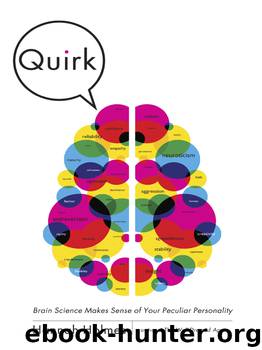Quirk by Hannah Holmes

Author:Hannah Holmes [Holmes, Hannah]
Language: eng
Format: epub
ISBN: 978-0-679-60452-5
Publisher: Random House Publishing Group
Published: 2011-02-22T05:00:00+00:00
Evolution of Sympathy
That Dutch study of how mothers helped their children is central to the evolution of sympathy. On its face, it seems so cold and sad that some mothers can’t take their child’s point of view. It seems so unmaternal that they scold instead of praising, that they dominate instead of guiding. Human mothers, we’re often told, are selfless creatures dedicated entirely to the health and welfare of their offspring. They’re not snakes who give birth and glide away. These selfish women must have no empathy, sympathy, or decency!
But that ignores the fact that a mother—every mother, whether snake, skunk, or sheep—has biological aspirations above and beyond an infant. In her DNA she dreams of launching not one, but a dozen offspring down the river of time. And to do that she has to watch out for her own health and welfare.
All mothers and their infants engage in a battle over this issue, from the moment of conception. It is in the offspring’s best interest to drag every nutrient and calorie it can absorb out of its mother’s body. It is in the mother’s best interest to hold something back so that she can raise future offspring. This battle continues after birth. An infant denied the opportunity to nurse does not quit without a fight. She’ll let loose wails that in earlier times could attract deadly predators.
But no matter how sympathetic a mother might be, the infant won’t gain the upper hand in this contest. Starvation remains a real threat to humans today, and the photographs that come out of refugee camps testify to the importance of motherly selfishness. Still strong enough to walk, mothers embrace their dying children. I’m sure they wish they could nurse their children, but evolution has outfitted them with bodies that will not permit it. When a female’s body fat drops below a certain point, she can continue to empathize with her child’s pain, but her body refuses to sympathize: Her body stops producing milk.
And how could it be otherwise? Why would evolution reward a body that would give its last calorie to an offspring, then die and leave the offspring to starve alone? The offspring of such sympathetic mothers don’t survive, and neither do the genes that would make a person so disastrously generous.
But neither could evolution produce mothers who would abandon an infant at the first sign of hardship. Evolution rewards those mothers who invest in their existing offspring but guard their ability to have more children in the future.
And the dynamic would not be much different for men. Human infants are so useless that they require twenty-four-hour protection for a number of years after birth. Many hands make light work, and they also make for more surviving babies. Males who are inspired to pitch in with child care increase the odds that their own genetic legacy will grow healthy and strong.
The contrast between Patsy and Robin highlights the fact that humans come in many shades of cooperativeness. Why would that be?
Download
This site does not store any files on its server. We only index and link to content provided by other sites. Please contact the content providers to delete copyright contents if any and email us, we'll remove relevant links or contents immediately.
| Anthropology | Archaeology |
| Philosophy | Politics & Government |
| Social Sciences | Sociology |
| Women's Studies |
Cecilia; Or, Memoirs of an Heiress — Volume 1 by Fanny Burney(32558)
The Great Music City by Andrea Baker(32018)
Cecilia; Or, Memoirs of an Heiress — Volume 2 by Fanny Burney(31956)
Cecilia; Or, Memoirs of an Heiress — Volume 3 by Fanny Burney(31941)
We're Going to Need More Wine by Gabrielle Union(19046)
All the Missing Girls by Megan Miranda(16023)
Pimp by Iceberg Slim(14506)
For the Love of Europe by Rick Steves(14121)
Bombshells: Glamour Girls of a Lifetime by Sullivan Steve(14073)
Talking to Strangers by Malcolm Gladwell(13370)
Norse Mythology by Gaiman Neil(13363)
Fifty Shades Freed by E L James(13239)
Mindhunter: Inside the FBI's Elite Serial Crime Unit by John E. Douglas & Mark Olshaker(9339)
Crazy Rich Asians by Kevin Kwan(9290)
The Lost Art of Listening by Michael P. Nichols(7506)
Enlightenment Now: The Case for Reason, Science, Humanism, and Progress by Steven Pinker(7311)
The Four Agreements by Don Miguel Ruiz(6763)
Bad Blood by John Carreyrou(6621)
Weapons of Math Destruction by Cathy O'Neil(6279)
